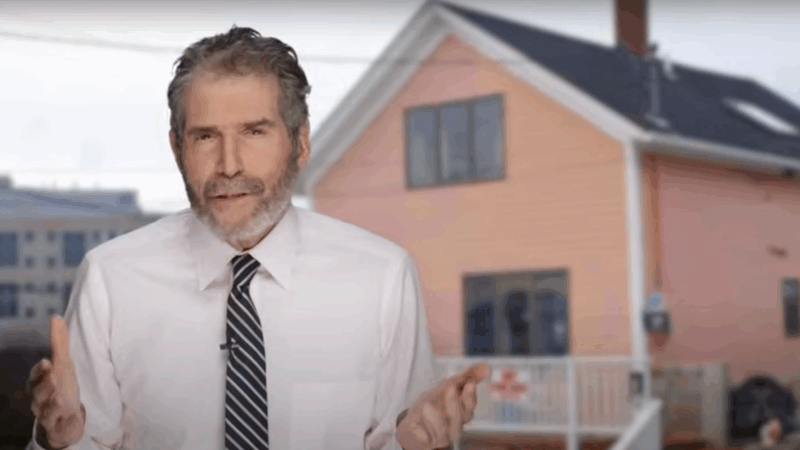The Government Seized Her Home for a Project That Never Happened
Twenty years after Susette Kelo lost at the Supreme Court, the land where her house once stood is still an empty lot.

Is your home your castle?
Not when eminent domain law lets politicians confiscate your property if they claim it's for "public use."
Politicians say they need the power to take property to build public projects like roads and railroad tracks.
OK. Seems reasonable. But now, developers collude with politicians to use the law unfairly, to force people to give up their land for private projects.
In 1994, Donald Trump tried to use eminent domain to take a woman's house so he could create parking spaces for limos outside his casino in Atlantic City.
I confronted him about it, saying: "You're bullying these people out!"
"To use the word 'bully,' John, is very unfair!" He replied. "This is a government case. This is not Donald Trump!"
"Yes, it's Donald Trump," I pushed back. "You and your cronies in government working together."
"Do you want to live in a city where you can't build schools?" he asked. "A city where you can't build roads or highways?!"
A court eventually denied Trump's Atlantic City land grab. That turned out well for everyone, since his casino went bankrupt, and no limos needed to park.
However, judges were less reasonable in another eminent domain case that went all the way to the Supreme Court.
Susette Kelo lived in a small pink house in New London, Connecticut.
New London politicians decided to sell her land, along with her neighbors', to a private business called the New London Development Corporation.
New London would then get "development," they say, and the tax revenue that would bring in.
Eminent domain law forces governments to pay owners "fair value" for their property, but the bureaucrats decide what that value is.
Kelo didn't want the money. She wanted her home.
I covered her story when she, with the help of the Institute for Justice, fought New London's government all the way up to the Supreme Court.
They lost. The Court ruled five-to-four in favor of letting the city bulldoze the neighborhood.
I confronted the city's lawyer: "Politicians can kick you out of your home?"
He replied, "Is this serving an important public purpose? We say it is."
New London said the new development would raise tax revenue.
That was 20 years ago. Where's the tax revenue today?
As so often happens, the politicians were wrong. That development never happened.
The land where Kelo's house once stood is still an empty lot.
As I write, the only thing currently under construction even near where her house was is a government-funded recreation center—that costs taxpayers' money.
Kelo's story shocked enough people that many states passed laws limiting politicians' rights to grab your property.
According to the Institute for Justice, "Since Kelo v. New London, 47 states have strengthened their protections against eminent domain abuse, either through legislation or state supreme court decisions."
Unfortunately, some places do still allow it.
Officials in the appropriately named town of Dolton, Illinois, propose to use eminent domain law to take the new pope's childhood home from its current owners. Dolton politicians want to turn it into "a historic site."
In Toms River, New Jersey, the mayor plans to use eminent domain to seize a church in order to build pickleball courts.
Recently, Georgia's government approved eminent domain to take parts of dozens of properties so it can build a private railroad that will serve just one rock quarry.
A woman who may lose her land asks, "If this happens, where would it stop?"
Good question.
When politicians and developers collude, no one's property is safe.
COPYRIGHT 2025 BY JFS PRODUCTIONS INC.


Show Comments (24)